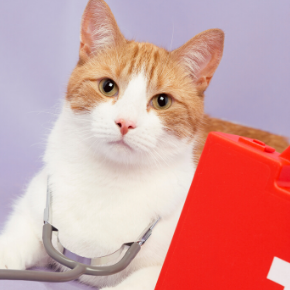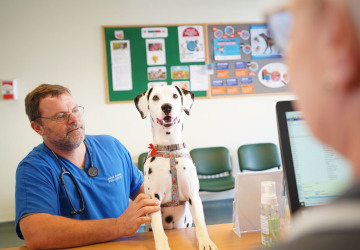
Learn what to do in a cat health emergency with Edgewood Veterinary Group.
August 7, 2020
Whether you have a stay-at-home cat or an avid adventurer, your feline friend can get themselves into an array of summer mischief and danger. The team at Edgewood Veterinary Group has put together some first aid advice for cat owners to help you understand what to do in an emergency.
Download our handy guide on cat first aid
Before thinking about first aid for your cat, you should go through the following five safety steps:
- Be calm – cats pick up on human emotions so it’s important to keep calm and think clearly in order to best help them.
- Be safe – especially with road traffic accidents, make sure you and others won’t be in any danger by helping an injured cat.
- Beware of bites – frightened and hurt cats can display aggressive tendencies so take care not to get bitten or scratched.
- Cat-only meds – never give your cat human meds, unless a vet tells you to.
- Call a vet – get vital advice over the phone to help your cat before you’re able to get the clinic.
If your cat needs emergency veterinary care, call 01621 828381
Now that you’ve learned some safety measures, below are 5 common reasons why your cat might need first aid treatment this summer.
Heatstroke – Spending too much time lazing on a sunny porch or window sill can cause heatstroke in cats, which is an emergency. Your cat may pant more than normal, appear agitated, and have distressed breathing, amongst other symptoms.
Dehydration – During the summer months especially, cats can get stuck in outbuildings, garages, and sheds after looking for a shaded place to rest. Check there if your cat is missing, and ask your neighbours too. After being trapped, cats are usually dehydrated and should have a vet checkup straight away. [Download our handy guide] to learn the ‘Cat Dehydration Test’.
Bee & wasp stings – A buzzing insect may seem like a fun game to your cat… until they get stung. Symptoms can include excessive licking, swelling, and redness.Stings on the face and mouth, and adverse reactions, should be checked by a vet quickly.
Poisons – Cats and some foods, drinks, plants, and other substances just don’t mix. One flower to note in particular is the lily, which can poison your cat even from touch. Poisoning symptoms vary and may not show for some time, it’s important to get your cat checked as soon as you suspect anything.
Trauma – Summer adventures can sometimes lead to accidents including falls, animal attacks, and road traffic accidents. Remember the five safety tips above before approaching an injured cat.
For more symptom information and tips on first aid for cats, download our handy guide today.






